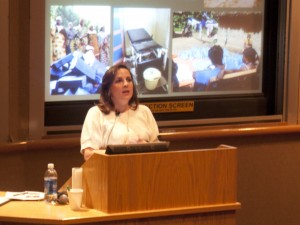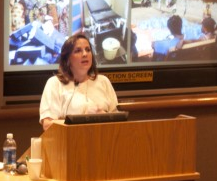Amy Ernst is passionate about a subject that is difficult to talk about for some people.

While speaking to students on Monday, April 2, at St. Thomas, Ernst shared her passion for her work as a rape crisis counselor in the Democratic Republic of Congo.
Students gathered in the 3M Auditorium to hear her speak about sexual violence against women and children in Congo, and their hope and strength.
Ernst said she learned of the issue after attending the “Vagina Monologues,” a play that said the Congo was the place that needed the most assistance helping those who have experienced sexual violence.
“I wanted to get a better idea of what was going on in the Congo. The media often shows a lot of sensationalism,” she said.
Sophomore Melissa Seymour, who attended Ernst’s lecture, agreed.
“The issues taking place in the Congo are censored in most media sources, so it’s essential that the truth is shared and heard,” Seymour said.
Ernst said she has always been passionate about the issue of sexual violence. When she was young, a family friend told her that she was sexually abused.
“I was aware of that at a very young age, so my life has kind of always focused on sexual violence and the reasons why it occurs,” she said.
Ernst trained and volunteered as a rape crisis counselor in Illinois before she decided to move to North Kivu, Congo, an active conflict zone, to help victims of sexual violence.
Junior Channing James said Ernst’s passion for the subject was obvious.
“You could tell that she had an emotional connection with these women and really wanted to get their story heard,” James said.
While in the Congo, Ernst worked with COPERMA, a Congolese organization with centers for rape victims, demobilized child-soldiers and displaced victims of war.
Ernst said that in the Congo, many rape victims are attacked when they work in their fields or flee from a confrontational situation.
“You have a girl running and oftentimes she’ll be stopped while she’s running and get raped on the road,” Ernst said. “She arrives in a community, no longer with her family, and she potentially becomes pregnant. It’s an agricultural society. If she has no field, she has no way of supporting herself economically, and she has no options.”
Ernst said that if the women are raped in or near their fields, many lose their fields or have to risk being raped again if they want to go back to save it.
“Some women do go back, and often they’re re-victimized. But they have to feed their kids,” Ernst said.
According to Ernst, these stories are not uncommon. She described a woman she met who had been raped, lost her field and had to take her children out of school.
“They haven’t been in school ever since,” she said. “The effects of the rape are not just emotional and physical, it really expands.”
Ernst told another story of a woman who was attacked by military men.
“She went to the hospital, and the doctor did not maintain confidentiality. It got out in the community, and she was ostracized,” Ernst said. “With that stigmatization, there is also the idea that a woman is ruined after rape. Some men even think of it as their wife being unfaithful.”
Ernst explained that an important aspect of rape-crisis counseling is giving rape survivors support and trust to make sure that they are well-received and supported in their communities.
“Simply saying to someone, ‘I believe you that this happened, and this isn’t your fault. It’s the fault of the individual who did this to you,’ can drastically change the success of recovery for a survivor,” she said.
Ernst believes that there is hope for victims.
“If you get the government to be held accountable and you have an infrastructure, a school system and some economic growth and opportunity for people, then I really think that this phenomenon of mass rape in the Congo will disappear pretty quickly,” Ernst said.
Students like Seymour said they walked away from the lecture with valuable insight into the overwhelming rape epidemic in the Congo and the struggles the conflict has created.
“Now that we have learned from Amy’s experiences, it’s our job to educate our peers,” Seymour said.
Amanda Ogbuehi can be reached at ogbu0322@stthomas.edu.

